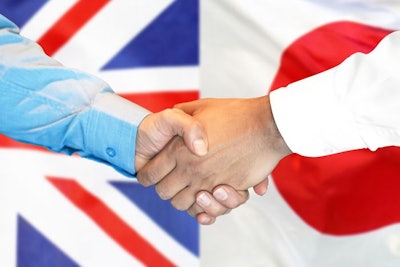
Following a series of bilateral talks, the United Kingdom (U.K.) has reached an agreement that will open access for its poultry meat on the Japanese market. The trade could commence as early as this month.
An agreement reached between the two countries could be worth as much as 65 million pounds (GBP; US$90.6 million; JPY10.0 billion) over the next five years. Nippon reports that the first consignment of U.K. poultry meat could be shipped to Japan as early as the end of June.
Securing access to the Japanese market offers new opportunities for the country’s farmers, producers, and exporters, according to the U.K. government.
A joint statement from the Department for International Trade and the Department for the Environment, Food and Rural Affairs (Defra) puts the value of the trade at up to GBP13 million per year, covering both fresh and cooked products. The agreement reflects acceptance of the high standards of U.K. poultry production by the Asian partner that is renowned for its “stringent food safety and import control regime, as well as for its taste for high-quality, varied cuts of meats.”
Agreement welcomed by U.K. industry bodies
“The British Poultry Council welcomes the exciting news of British export market access for poultry meat to Japan, the world’s third largest economy,” said the Council’s chief executive, Richard Griffiths. “Our industry has worked closely with Government to open doors and create new opportunities for British poultry meat businesses that produce safe, affordable and nutritious food to world-class standards. We look forward to carrying on pursuing new markets to continue putting UK poultry meat on every table around the world.”
“We are delighted at the news of the UK gaining export market access for poultry meat to Japan, commented International Meat Trade Association (IMTA) CEO, Katie Doherty. “The announcement means that IMTA members and other U.K. exporters can take advantage of the tariff reductions granted by the U.K.-Japan Economic Partnership Agreement. The agreement reduces tariffs on frozen chicken cuts from an average of 10% to zero over a number of years. Without the market access Defra has negotiated, U.K. exporters would not have been able to benefit from these tariff reductions which the government worked to secure.”
Step-wise progress in U.K.-Japan agreement
Opening of the market followed a series of complex negotiations over the last four years between the U.K. and Japanese officials to agree specific animal health requirements, according to U.K. health minister Victoria Prentis.
At the end of 2020, the U.K. and Japan signed a Comprehensive Economic Partnership Agreement, which has since come into effect. For the U.K., this will gradually allow U.K. businesses tariff-free trade on almost all goods exported to Japan.
Key to the latest agreement between the trading partners on poultry meat trade were successful negotiations on Animal Health Requirements. Talks between Japan’s Ministry of Agriculture, Forestry and Fisheries and Defra concluded successfully on fresh and cooked poultry products in April of this year.
More on the Japanese poultry meat market
In a report on global poultry industry trends at the end of the last quarter, Rabobank highlighted Japan as among those that had been performing well. Struggling with an oversupplied market at that time was the European Union — of which the U.K. had been a member until last year.
At around the same time, the USDA Foreign Agricultural Service (FAS) was forecasting that Japanese chicken meat production in 2021 would be hardly changed from the previous year at 1.765 million metric tons (mmt). Meanwhile, imports into Japan were expected to increase only marginally year-on-year to 1.01mmt. Domestic consumption of chicken was not forecast to change significantly from the 2020 volume of around 2.8mmt.
Citing data from Japan Customs, FAS reports imports of chicken into Japan in 2020 of 429,000 metric tons (mt) from Thailand (305,000mt of prepared products and 124,000mt chilled/frozen), 397,000mt from Brazil (all chilled/frozen), and 159,000mt of prepared products from China.
Since November of 2020, Japan’s poultry flocks have been hit hard by highly pathogenic avian influenza. A total of 65 outbreaks linked to the H5N8 virus variant have been officially registered, directly impacting almost 10 million poultry. Many of the losses were laying hens. The most recent cases were reported in March of this year, and restrictions across the country are now being eased.
Other recent related trade negotiations
Coming into effect on January 1, 2020 was the U.S.-Japan Trade Agreement (USJTA). Under this agreement, Japan committed to provide substantial market access for the U.S. by phasing out most tariffs, enacting meaningful tariff reductions, or allowing a specific quantity of imports at a lower duty.
Following implementation of USJTA, nearly 90% of U.S. food and agricultural products exported by the U.S. to Japan are now duty-free, or receive preferential tariff access.
In recent days, the U.K. government’s Department for International Trade has set out a framework for a new Free Trade Agreement with Australia. Covering beef, sheep meat, and dairy products — among a range of other goods — important details are currently being worked into this agreement in principle.
According to the National Farmers Union (NFU), U.K. producers have concerns over the potential impact of trade deals that eliminate all tariffs on imports from the world’s largest agricultural exporters, such as Australia.
“While details remain very thin on the ground, it appears that the agreement [with Australia] will include important safeguards that attempt to strike a balance between liberalizing trade and supporting UK farm businesses, as well as a reasonable time period to allow U.K. farmers to adjust to the new trading environment,” said NFU president, Minette Batters.















